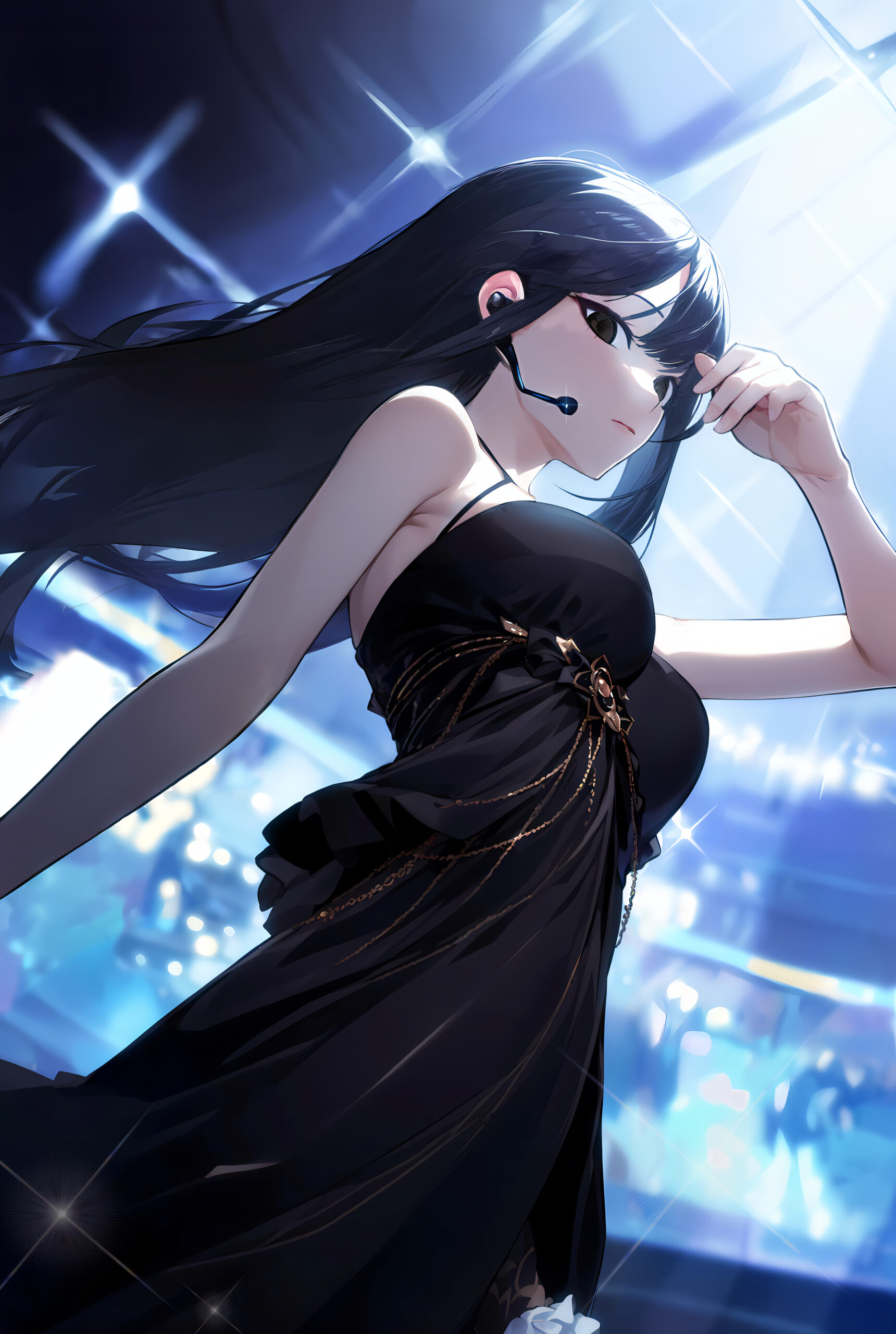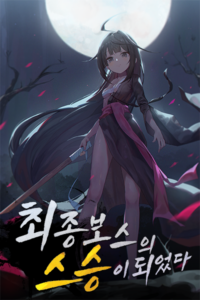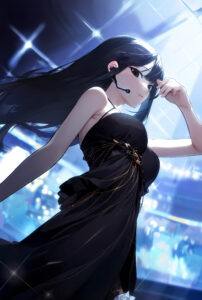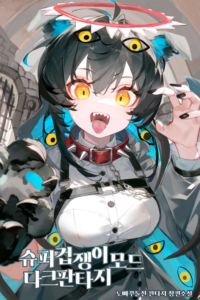The hall was calm and silent until Do-hee Lee stepped up to the stage and sat at the piano.
All the audience were holding their breath very thoroughly.
“Perhaps even idol fans have some etiquette? They could at least clap a little.”
Do-hee, who had been gazing at the piano keys for about five seconds, smiled and gently placed her right hand on the keys.
At that moment, the pianist Jung Han-bin couldn’t help but admire silently.
“…Very nice. That expressive attitude.”
Unlike the previous participants who merely acted and mimicked expressions.
Do-hee was already embodying her emotions before starting to play.
Not just sad emotions, but with a faint smile.
Her lips trembled slightly, as if she couldn’t hold back her sadness.
“…Then, what about her performance? I wonder if her attitude and expressiveness will be good…!”
With Jung Han-bin’s anticipation, Chopin’s Ballade No. 4, Op. 52 began.
The start seemed to express an indescribable faint laughter, like the first note in G octave 3.
If you didn’t listen carefully, it almost sounded empty, a gentle whisper starting.
Then Do-hee’s left hand effortlessly joined in.
So-so-so, effortlessly flowing without interruption.
Warm C major harmonies filled in, distinct from her right hand.
It felt like watching stars being drawn or hearing a celestial song.
“The beginning… is definitely different from the other participants.”
Of course, it was still too early to make an assessment.
This first performance was a structured pattern already established by pianists.
“What’s important…”
Before long, the notes rang out with an accent.
The progression of C major changed to F minor.
Finally, the theme of Chopin’s Ballade No. 4 began.
Now it was time for the mournful melody that would quickly draw one into Chopin’s emotions.
Very graceful, with delicate emotional lines.
Rather than intense sorrow, it conveyed a restrained sense of loneliness.
“Do-hee, how will you express this?”
At that moment, Do-hee’s head began to sway.
And the power of the sound changed.
The restrained emotions spread to the very end of the hall.
Jung Han-bin knew exactly why.
It was Do-hee’s perception that had changed.
In that small space, right at the piano, to this vast hall.
The proof was Do-hee looking far away.
Surprisingly, the sound interacted significantly with the performer’s gaze.
It created expressions of emotion.
Looking into the distance made the touch, phrases, and resonance feel prolonged.
“It’s not an illusion; the touch actually changed.”
In other words, this performance meant that Do-hee was very aware of what was happening.
It meant she wasn’t just playing in a soundproofed tiny practice room alone.
She realized she was performing in a hall that could accommodate 500 people.
Generally, students had no awareness of that at all.
They had few opportunities to perform in such a wide space, and little room to spare.
But Do-hee?
“They said she’s an idol.”
What’s 500? She must have performed in front of thousands.
Perhaps she even did in front of tens of thousands.
It could be.
Since they said it’s really popular.
In a performance that hasn’t even reached a minute yet.
With still 10 minutes left in the performance.
Jung Han-bin started grading a bit early.
First, the technical aspects.
Beats, rhythm, pedaling.
“As long as there aren’t any huge mistakes, this kid is definitely first place.”
Everything scored 100 points.
But there were still areas where Jung Han-bin couldn’t assign a score.
Specifically, attitude and phrasing.
Those two criteria could change significantly depending on how one studied and interpreted the piece.
In fact, there was one detail Jung Han-bin was missing here.
That Do-hee was a high school participant.
And Jung Han-bin hadn’t seen how high schoolers study and interpret music.
After all, he thought it stemmed from the teacher’s guidance.
Instead, he only looked at the performer’s facial expressions, arm positions, and gestures.
In other words, demanding study and interpretation as evaluation criteria from Do-hee, who was the first high school participant ever, was quite unfair.
Do-hee’s early expressions, keyboard skills, and gaze were all flawless, as if from a pro.
“But… if it’s just this, it means nothing.”
That too was a typical professional performance.
“If you’re really a genius…”
He hoped for her to show something of her own.
Not a copy learned from somewhere, but something unique to her.
“Right, it’s still the beginning…”
The performance hadn’t even reached the middle yet.
Naturally, the highlight of Chopin’s Ballade No. 4 is in the latter half.
As it approaches the coda, the individual expression, interpretation, and study come into play.
How one interprets, plays, and connects that part matters.
“If you’re truly a genius… your expression…”
Sweat began to form in Jung Han-bin’s hands.
*
Ballade No. 4 is a piece overflowing with Chopin’s maturity.
Since Chopin, who passed away young at 39, composed it later in life, it’s packed with new concepts.
─♬♪♫
For instance, the numerous half-tones being played right now.
This technically and musically complex piece struggles to express the theme of restrained loneliness throughout its duration.
That’s why Ballade No. 4 is considered one of Chopin’s greatest works, and the interpretations of performers branch out in various ways.
Some masters would occasionally just glide over notes.
They didn’t play accurately.
Yet, somehow it still sounded amazing.
Some masters didn’t maintain the unique thin yet clear and elegant touch of Chopin.
Sometimes, they would play with a distinctly strong and intense sense of restrained loneliness.
But I wasn’t one of those masters.
And I wasn’t thinking of mimicking any master’s performance either.
I was playing very conventionally, like a student.
Following the sheet music, adhering to everything, singing everything.
It wasn’t about earning points anymore.
It wasn’t about winning an award.
This was my interpretation.
Emotions layered together, step by step.
A highly restrained sense of solitude.
This conventional performance is a staircase.
Expressions and gazes are merely tools.
That’s all there is to it.
It brings all my emotions to the peak.
A method for that moment when it bursts.
And in that process,
the current second half plays a huge role.
When playing this part, Bach often comes to mind.
It resembles the imitation counterpoint and Bach’s fugue quite a bit.
Among Chopin’s pieces, the one that can be said to resemble a fugue is probably only this Ballade No. 4.
Even though Chopin was deeply immersed in Bach’s music,
he was never strict with the form of counterpoint.
Of course, that doesn’t mean this piece has a distinct counterpoint form either.
But that fragrance is clearly detectable.
The scent of homophonic counterpoint.
That was probably Chopin’s own way.
Pastoral and serene.
In other words, a way of returning to restrained Baroque music.
Because Chopin is a genius.
But finding signs of an explosion in restrained Baroque music is tough.
How can you expect an explosion from music born out of a restrained form?
It was a contradiction.
But it wasn’t a contradiction.
Rather, in my interpretation, it was possible to include Baroque.
It was a public misunderstanding to think that Baroque music is calm and dull.
Originally, the Portuguese Baroque means “distorted pearl.”
It implies that it was so extravagant that it became distorted.
The pieces of the Baroque era were, after all, colorful and extravagant, separate from religious music.
Though they’re written calmly in the sheet music, they were extravagant and flamboyant pieces.
The fact that piano battles were active in the Baroque era shows that.
What qualifies as a good pianist today?
It’s about who interprets the sheet music well and who has good technique.
But what about Baroque music pianists?
It’s about who plays flamboyantly.
The way piano battles were held in the Baroque era was like this.
First, they would play the piece once in a structured manner according to the sheet music.
Then the performer would go back to the beginning and play it again.
But the second performance is distinctly different from the first.
It’s adorned with a lot of decorative notes and added improvised trills.
That’s Baroque music.
It meant the performer played freely according to their personality.
So, I planned to play the piece in my own way.
And now, in the latter half, before the coda.
Pianissimo was the beginning.
Like Chopin, who infused beautiful Baroque essence into his work,
like Chopin, who wanted to return to the beginning.
I too, not with extreme arrangements but with simple variations,
intend to only infuse Baroque essence.
Purely for the joy of the beginning.
*
Jung Han-bin let out a little disappointment.
Clearly, the performing skill and unique vibe weren’t those of a high school student.
But they still couldn’t break out of the established mold.
That meant there was no new interpretation in the performance.
“Well, if I were to reinterpret this piece… it would be on an international competition level.”
Still, I have to acknowledge the recognition.
With that performance skill at 17, they’d rank high even in college competitions.
“Let them take 1st place.”
Feeling bored, Jung Han-bin took a pen and wrote a total score of 100 on the evaluation sheet.
There was no need to go to the coda.
The overly rigid 8-minute performance made the conclusion predictable.
Jung Han-bin leaned his back against the chair.
The female professor next to him was still smiling, watching him.
It seemed like his expectations were just too high.
‘Now… maybe about 2 minutes left. D-flat major. It’s a pianissimo part.’
At that moment, Do-hee Lee’s performance noticeably changed.
“Huh?”
It wasn’t just her expression, touch, or gaze that had shifted.
The piece itself had changed.
The tempo slowed down a bit.
The sheet music just said “pianissimo,” very softly.
There was no indication of ralöntando, or gradually slowing down, yet she had changed the tempo on her own.
Given how Do-hee had played until now, there was no way it was a mistake.
Even the difficult pedaling had been executed perfectly.
This section, originally meant to build emotion before the coda, should create a feeling of a crescendo.
‘In other words, an emotional climax.’
But Do-hee’s slowed tempo gave off the impression that she was suppressing her emotions even more, holding back until the end.
‘But she really should let it out once before the coda.’
Yet, there were still no signs of that.
Do-hee was playing softly and comfortably.
Even though she should have been pressing down strongly and heavily.
The restrained emotions should have burst forth like a genuine expression.
The progress, created from the start at a slow tempo, instead highlighted the pure beauty of the piece.
But the obsession that it must be played strongly, that it must explode, swallowed his mind.
Then, Do-hee started to play with intensity.
But it didn’t feel refreshing at all.
The strong notes came too late, just a few measures.
But perhaps that’s why the coda became even more expected.
The restrained emotions that couldn’t be released seemed like they would erupt with passion in the coda.
And then a new softness indicating the start of the coda was heard.
─Again, pianissimo.
That softness was so contrasting it felt like falling into another world.
Yet, it was only for a moment before the coda began.
Do-hee’s fingers struck the keys powerfully, revealing all the pent-up emotions.
At that moment, her expression was filled with a gritty smile, stained with excitement and passion.
Sometimes it looked like she might even cry.
That emotional impact resonated through my ears, making my head buzz, as if I were experiencing the fervor directly.
Then, as she smoothly and organically swept across the keys, emotions roiled.
Finally, when only the powerful strikes on the keys remained, striking the piano with a bang.
─Clap Clap
Only a lingering sense of catharsis remained.
Without realizing it, I stood up and clapped.
Soon, applause echoed from the audience as well.
Of course, the professor next to me looked at Jung Han-bin oddly as he applauded.
But that didn’t matter anyway.
Even while clapping, Jung Han-bin recalled that last moment.
In a frenzy of emotions, as if blinded by rage, he smashed all the remaining keys with his fingers, ignoring harmony.
The progression building up to that final strike was Do-hee’s best interpretation.
*
‘Ah crap. My finger went numb, so I hit the last note wrong.’
Support me by donating at least $10, and you'll have the right to request any novel from Novelpia (excluding 19+ content) using a newly developed tool.




![[TS] Malicious Sniper [TS] Malicious Sniper](https://cyborg-tl.com/wp-content/uploads/2024/10/1729904607-3104-TS-Malicious-Sniper.png)










